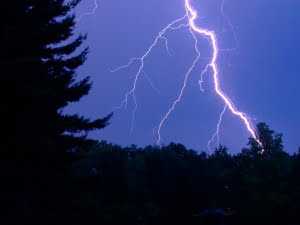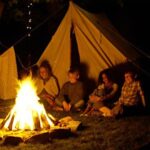by Liz Childers

If the last month has taught Americans anything, it is that weather can be highly unpredictable and dangerous – especially in the spring. While dangerous thunderstorms can be forecast in advance, spring storms frequently crop up with no warning. And those predicted storms could cover territory that was not prepared for the brunt of tornadoes or damaging wind and rain that comes along with the rains.
For campers, spring is one of the best times to venture into the woods. When the skies are clear, you can count on temperatures that are just cool enough for a great hike and an enjoyable campfire, but just warm enough to be comfortable for sleeping. Wilderness campsites are boasting their best blooms and the insects – especially mosquitos – have not completely come forth in all their buzzing and biting glory.
But then there is that safety issue – the one that comes from spring thunderstorms. Do you know what to do if you hear thunder while camping? This is what the National Weather Service advises for people caught in a storm with no shelter:
Avoid open fields or, even, small clumps of trees. If you are in the middle of a field or near a single tree when the storm crops up, run into the forest – literally. If you cannot get out of the open area, crouch low with your head down.
If you are camping in an open area, pitch your tent in the lowest area. Look for a ravine or valley.
Stay away from all objects that can conduct electricity. This means avoiding water, wet objects, and metal objects. In your campsite, this could mean a river, wet clothes, or a camping backpack with an external or internal metal frame. Lightning can travel long distances through these items.
The U.S. Department of Agriculture adds more advice for campers caught in a storm:
If you are camping in the woods, do not pitch your camping tent near the tallest trees. Look for a shorter clump of trees in the campsite.
Don’t sit or lie on the ground, because this gives more surface area of your body through which the lightening can travel. Instead, crouch low with your head down and your ankles touching. Standing on your sleeping pad will insulate you from the ground and potential electrical current.
If you are in a group, position everyone at least 15 feet apart. If lightening does strike a member or members of the group, this distance will ensure some members will remain safe and be able to tend to those injured.
Once the storm is over, wait before returning to an open area. Lightning can still strike even when you think the bad weather had passed.
Stay safe this spring and do not take any risks with the weather when you are camping! Do you have any additional tips for weather safety in camp?




